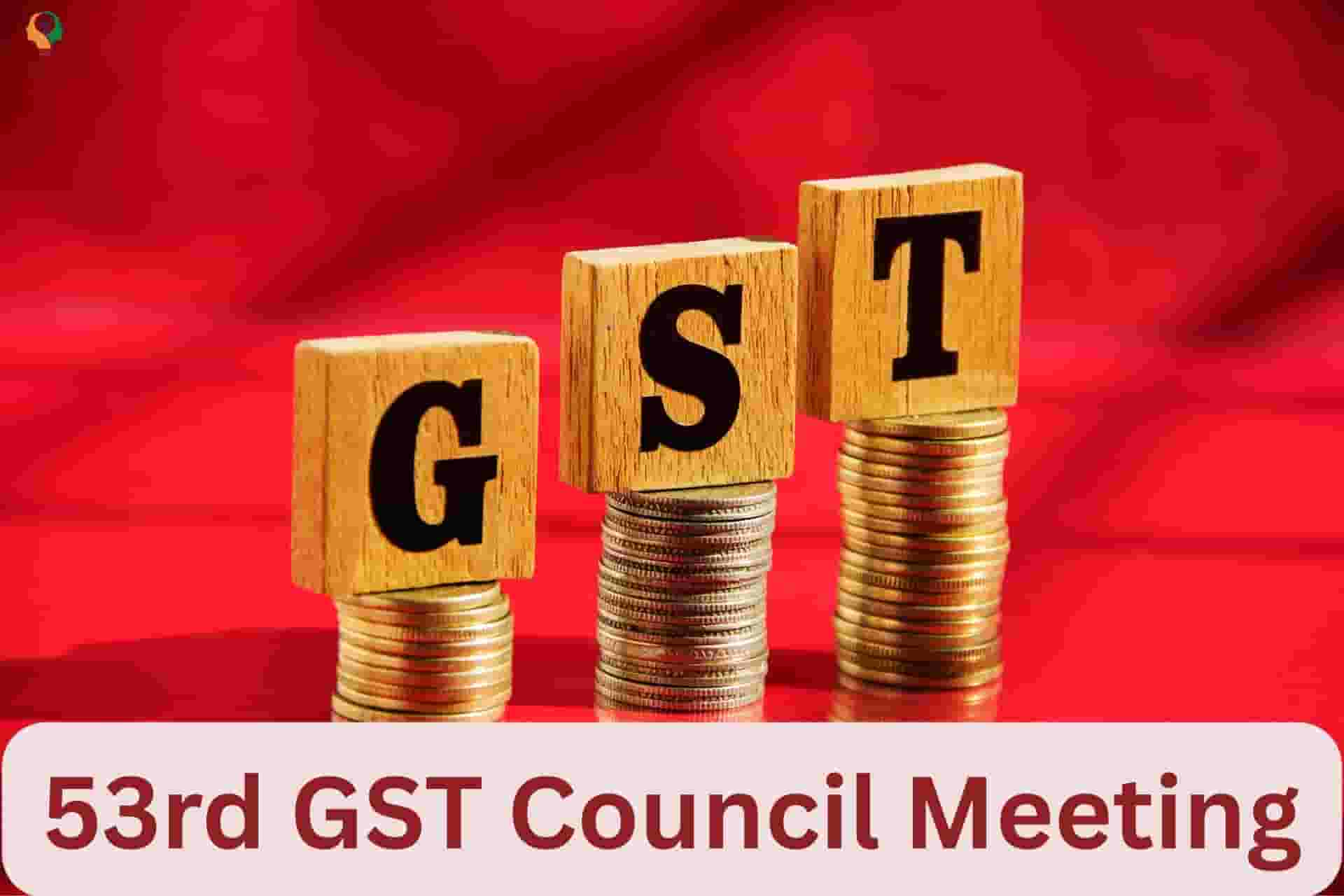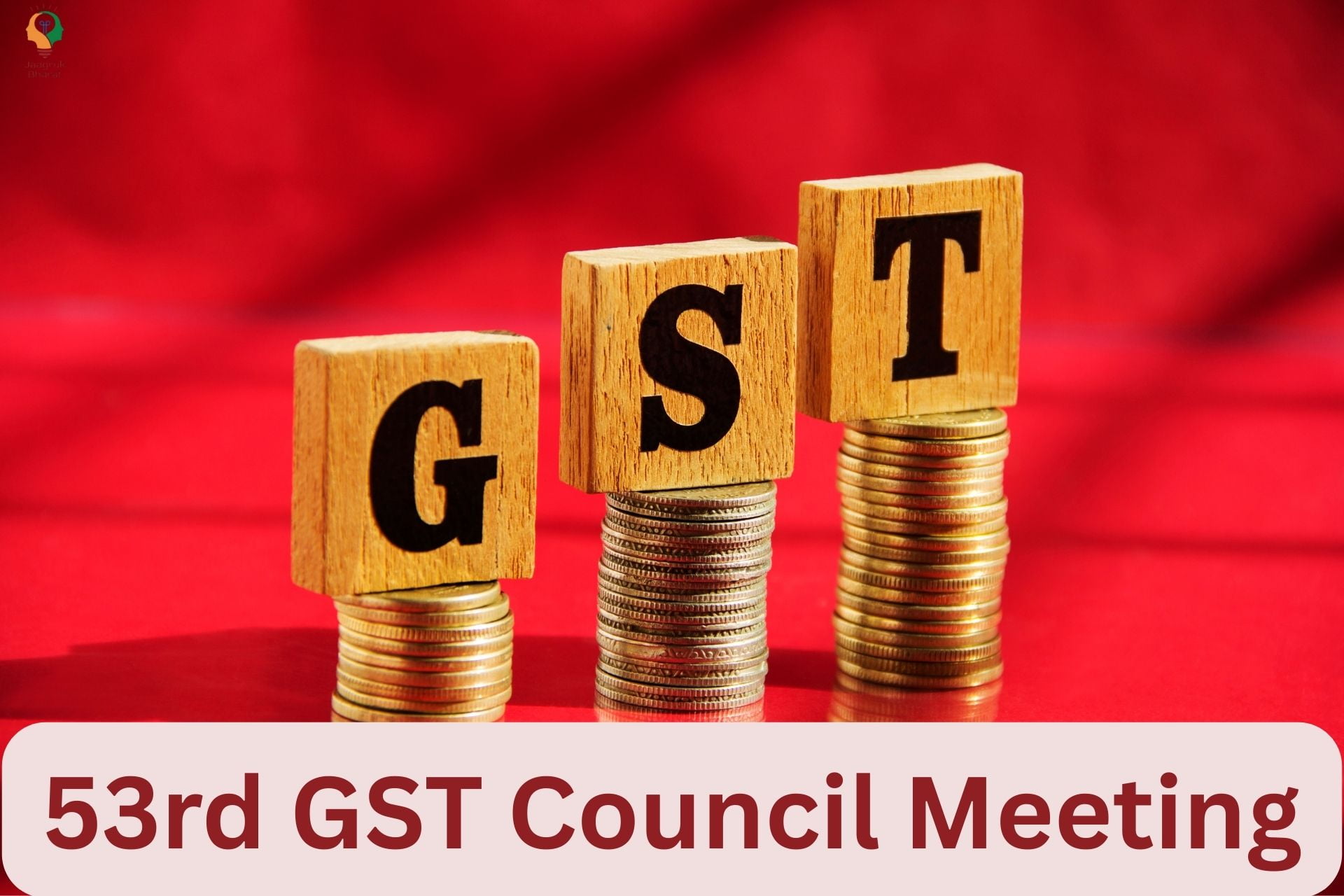What To Know About The 53rd GST Council Meeting? Major Changes, Announcements And Benefits
Updated: 10-11-2025 at 8:30 AM
1k


The 53rd GST Council Meeting held on June 22, 2024, was chaired by Union Finance Minister Nirmala Sitharaman, along with State Finance Ministers and officials. The 53rd GST Council meeting press release highlighted several tax reforms, compliance relaxations, and rate changes that directly impact businesses and consumers.
Before diving into the decisions, let’s revisit the basics of GST and the role of the Council. What GST is and how it impacts the Indian economy.
Overview
The 53rd GST Council Meeting held on June 22, 2024, brought several important reforms, tax rate changes, and compliance relaxations for taxpayers. Before diving into the highlights, here’s a glance at GST, the Council’s role, and its key functions.
| Particulars | Details |
|---|---|
| What is GST? | Goods and Services Tax (GST) is a single indirect tax applied on the supply of goods and services, replacing multiple indirect taxes. |
| Types of GST | SGST, CGST, IGST, and UTGST, depending on state, central, inter-state, and UT transactions. |
| When Introduced? | First proposed in 2000, GST was officially implemented in India in 2017 after the passage of the 122nd Constitutional Amendment Bill. |
| Who Governs It? | The GST Council, formed under Article 279A, consists of the Union Finance Minister, State Finance Ministers, and UT representatives. |
| Role of GST Council | Decides tax slabs, reviews exemptions, makes recommendations on compliance rules, and monitors uniformity across states. |
| 53rd GST Council Meeting Date | Held on June 22, 2024, chaired by Finance Minister Nirmala Sitharaman. |
| 53rd GST Council Meeting Notification | Issued with details on Aadhaar-based authentication, GST rate cuts, exemptions, and compliance relaxations. |
| Upcoming Sessions | The 54th GST Council Meeting and 55th GST Council Meeting are expected to continue reforms. Stakeholders are also awaiting the GST Council meeting next date for fresh announcements. |
What Is GST?
The Goods and Services Tax, or what the common people know as the GST, is a single indirect tax charged on the supply and purchase of goods and services. GST is a destination-oriented, multi-stage tax levied on every additional value.
The GST was introduced in India in 2000 by then-Prime Minister Atal Bihari Vajpayee. It was concluded that the GST could change and improve the Indian tax structure.
The 53rd GST Council meeting press release highlighted how GST has streamlined taxation by replacing multiple indirect taxes. The central taxes replaced after the implementation of the GST are
-
Duties of Excise
-
Service Tax
-
Central Excise Duties
-
Additional Duties of Excise
-
Additional Duties of Customs
-
Additional Duty on Customs
-
Cess and Surcharge
Also Read: Difference Between GST Compensation Cess And Income Tax Cess?
Different Types Of GST
GST is structured into different categories to ensure fair distribution of tax between the Centre and States. Let’s look at the four major types of GST and how each one applies in different transactions.
-
SGST, also known as the State Goods and Services Tax, is imposed by the state government on intra-state goods and services transactions.
-
CGST, also known as the Central Goods and Services Tax, is imposed by the central government on the intra-state transaction of goods and services.
-
IGST, also known as the Integrated Goods and Services Tax, is charged on inter-state transactions of goods and services and is applied to imports and exports.
-
UGST, known as Union Territory Goods and Services, is levied by UT and is imposed on all transactions carried out in any UT.
The 53rd GST Council meeting notification and future updates from the 54th GST Council meeting and 55th GST Council meeting often review these tax structures to ensure smooth implementation.
What Is The GST Council?
In 2016, after the 122nd Amendment Constitutional Bill was passed by both Houses of Parliament, the GST came into force in India.
As per Article 279, the GST Council is made to ensure all the states and UTs are following the rules and regulations, along with making recommendations on all issues related to the GST.
The GST council members are responsible for the rate slabs of GST or whether it needs any modification on certain products and services.
However, in 2022, the Supreme Court of India said that the recommendation made by the GST Council was not binding. The court stated that, according to Article 246A of the Constitution, both Parliament and the state legislature have simultaneous power to legislate on GST.
The 53rd GST Council meeting notification 16(4) further clarified certain compliance relaxations and highlighted the role of negotiation between the Union and States. Stakeholders now look forward to the GST Council meeting next date for additional clarifications.
Also Read: Centre Introduces Biometric ID To Fight GST Fraud In India
Key Points To Know From the 53rd GST Council Meeting
Now that we understand GST and the Council’s role, let’s move to the major highlights from the 53rd GST Council meeting held on June 22, 2024, in Delhi, which captured several important updates:
Aadhaar-Based Biometric Authentication
“There is going to be a rollout of biometric-based Aadhaar authentication on an all-India basis. This will help us to combat fraudulent input tax credit claims made through fake invoices in the cases,” announced Finance Minister Nirmala Sitharaman. This will help enhance tax compliance by minimising fraud activities.
GST Rate On Milk Cans
Now consumers have to pay a uniform GST rate of 12 per cent on all milk cans, regardless of whether the body is made of iron, steel, or aluminium. The step has been taken to standardise the tax treatment of products.
GST On Petrol And Diesel
The CGI wants to reinstate the GST regime for petrol and diesel. The agreement is still pending among states on the imposed tax rate. The measure is to levy a uniform tax on fuels across India. The topic is expected to return in the 54th GST Council meeting or even the 55th GST Council meeting.
Services Provided By Indian Railways
To the relief of consumers, the GST council presented an exemption from GST on platform tickets. The step is to aim to reduce the financial burden on the passengers. The measure is taken to make the railway service more reasonable and affordable for people.
GST Reduction On Carton Boxes
The GST tax rate on all forms of carton boxes has been lowered from 18 per cent to 12 per cent. The step is taken to make both consumers and manufacturers benefit by reducing the overall cost of packaging materials.
Exemption For Hostel Accommodation
Hostel accommodation services outside all educational institutions were exempted from GST up to Rs 20,000 per person every month. This is to make hostel housing reasonable for non-student residents.
Also Read: 20 Easy Ways to Save Income Tax In 2025
Conditional Loans And Central Support To States
The Union Government will aid all states with timely tax devolution, GST compensation settlements, and Finance Commission grants. The Finance Minister underlined the ‘Scheme for Special Assistance to States for Capital Investment’, stating that while most loans are unrestricted, a section remains conditional on states implementing citizen-friendly reforms and capital projects across industries.
Small Taxpayers Will Get Extension Of GSTR 4 Filing Deadline
To assist small taxpayers, the GST Council proposed extending the deadline for providing details and returns in the GSTR-4 form. The timeline is extended from April 30th to June 30th. The extension will be applicable for returns for the financial year 2024–25 onward. Although this change was also mentioned in the 53rd GST Council meeting notification.
Interest and Penalties Waiver For Non-Fraudulent Cases
The Finance Minister announced that the GST Council has proposed to waive off all interest and penalties for demand notices issued under Section 73 of the GST Act. This applies to cases not involving fraud, suppression, or misstatements. This is part of the reforms outlined under the 53rd GST Council meeting notification 16(4).
Takeaway
The 53rd GST Council Meeting press release represents a significant step towards easing the burden and addressing the grievances of taxpayers. In her statement, the Finance Minister stated, “Today, the GST Council meeting has taken a lot of decisions on trade facilitation, easing compliance burdens, and relief to taxpayers in terms of compliance easing out.”
Here, read the complete report of the Ministry of Finance on all the recommendations made at the 53rd GST Council Meeting.
Get the latest updates on government schemes and policies with Jaagruk Bharat. Join India's biggest Jaagruk Bharat community. Share your thoughts, questions, and favourite topics with us.
Frequently Asked Questions
0
0
1k
0
0
1k Views
0
No comments available





Our Company
Home
About
T&C
Privacy Policy
Eula
Disclaimer Policy
Code of Ethics
Contact Us
Careers
Cancellation & Refund Policy
Categories
Women
Insurance
Finance
Tax
Travel
Transport & Infrastructure
Food
Entertainment
Communication
Government ID Cards
E-commerce
Traffic guidelines
Miscellaneous
Housing and Sanitation
Sports
Startup
Environment and Safety
Education
Agriculture
Social cause
Employment
Disclaimer: Jaagruk Bharat is a private organization offering support for documentation and government scheme access. We are not affiliated with any government body. Official services are available on respective government portals. Our goal is to make processes easier and more accessible for citizens.
All Copyrights are reserved by Jaagruk Bharat